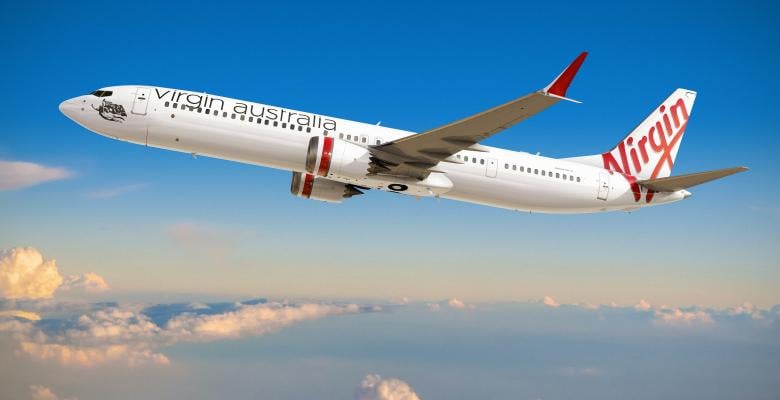Virgin Australia Restructures MAX Order; No Widebody Return In 2021

Virgin Australia has cut its Boeing 737 MAX orders by about half but remains focused on narrowbody operations, signaling that a return to widebody flying is still on the agenda but remains a long-term prospect.
The airline announced Dec. 9 that it reached a deal with Boeing to restructure its MAX order. Virgin previously had 25 of the 737-10 version due from July 2021 and 23 737-8s due from 2025. Under the revised agreement, it will only take the 25 737-10s, with first delivery pushed back to mid-2023.
Virgin had delayed the MAX delivery schedule before, most recently in 2019. The airline has since been through a voluntary administration process, which caused it to cut its fleet size and negotiate further postponement of the MAXs.
“The restructured agreement and changes to the delivery schedule of the [737-10s] gives us the flexibility to continually review our future fleet requirements, particularly as we wait for international travel demand to return,” Virgin CEO Jayne Hrdlicka said.
Adding the larger -10s to its existing 737 fleet will give Virgin the “ability to manage demand and deploy the [-10s] on high-density domestic and short-haul international routes or where there are constraints due to slot availability limitations,” Hrdlicka said.
Virgin phased out all of its widebodies—Boeing 777s and Airbus A330s—during the administration process. The carrier has said it intends to eventually add more widebodies, and it had previously signaled that its future widebody needs could be included in the MAX negotiations.
However, any widebody deal will have to wait. In its latest announcement, Virgin said it “remains in discussions with aircraft manufacturers on a fleet strategy to support the reintroduction of widebody services when long-haul international travel demand returns.”
Virgin Australia will probably not resume widebody flying within the next 18-24 months, Hrdlicka said during a CAPA Live event on Dec. 9. She noted that because it is a buyers’ market at the moment, obtaining the right aircraft will not be a constraint.
In terms of fleet strategy, airlines “have flexibility that we would [not] have dreamed of a couple of years ago,” Hrdlicka said. “Access to aircraft is much easier than its been probably in two decades,” and aircraft prices are now “incredibly attractive.”
The Australian domestic market is going to be “super competitive” for the immediate future as the incumbent carriers rebuild their networks, Hrdlicka said. This will be a challenging situation for Regional Express Holdings as it looks to add 737s for the first time to take on Virgin and Qantas on trunk routes.
Before COVID-19, Qantas had a domestic market share of about 43%, Virgin Australia had 34%, and Jetstar 23%, Hrdlicka said. She noted that Qantas and Virgin have both committed to maintaining their domestic market shares.
Virgin Australia “has no intent of backing off that market share” as it is “well-funded” and has a strong balance sheet thanks to its acquisition by Bain Capital, Hrdlicka stressed. Rebuilding the domestic market is a “long game,” she said. “So of course we very mindful of making good, prudent financial decisions, but this is very strategic.”





